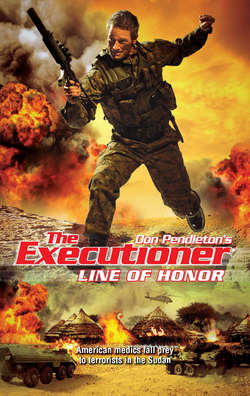Читать книгу Line Of Honor - Don Pendleton - Страница 13
Оглавление5
Bolan’s caravan went hostile. By the dawn’s early light, Rover 1 now sported a recoilless antitank gun mounted in the bed and an automatic grenade launcher on the hood for the man riding shotgun. Rover 2 mounted a Russian .50-caliber machine gun in the bed and a light machine gun in the passenger-side hood mount. The caravan’s mother ship, the Unimog, had a ring-mounted .30-caliber gun on the cab roof. Each vehicle was packing a HongYing 5 shoulder-launched antiaircraft missile in the back, and had locked and loaded RPGs.
Pienaar lit a cigarette. “So, you and T-Lo going on recce?”
“If we’re not back by noon, start heading east. We’ll catch up. If you haven’t heard from us by sunset, we bought it. In that event I gave Russo a number to call. You’ll be informed of the mission parameters and asked if you want to continue. If the team agrees to go ahead, I want you to take command. Though I would pay particular attention to anything Russo has to say. The French have assets and intel in the region.”
“Copy that, Striker.” Tshabalala walked up and the two brothers-in-law fist bumped. Pienaar jerked his head at Bolan. “Have him home at a decent hour, T-Lo. Keep your hands to yourself.”
Tshabalala threw back his head and laughed.
Bolan threw a leg over his bike. His MZ 125 SX motorcycle was German-made and ex-French military issue. The four-stroke thumper had been painted matte black and was remarkable for weighing only 124 kilos while at the same time being remarkably tough. Tshabalala checked his kit one more time and looked at Bolan expectantly. He had declared himself an “aces” cross-country cyclist. It turned out Pienaar was an actual local South African champion and had taught Tshabalala all he knew, but Pienaar was also the most experienced truck driver, as well, and had become Bolan’s de facto second in command.
The Executioner pulled down his goggles and grinned at his companion. “Tshabalala?”
“Say it ten times fast, china.”
Bolan gave the scout a sly look before he pulled down his goggles. “Zulu?”
Tshabalala grinned and pulled down his own. “Too right I’m Zulu.”
“You’re down with the plan?”
“Well, it sounds a bit like mission creep to me. Then again, this Mnan sounds like a real clutch plate.”
Bolan kicked his MZ into life and headed out across the hostile landscape. Tshabalala took position at his eight o’clock.
By sunrise the Sudan was beautiful in its own harsh way, and one had to experience the African sky firsthand to understand all the talk about it. The soldier followed the path the refugees had left. The track was faint, and the morning wind was wiping out what there was, but they were made of up the very young and the very old without much in between. Guessing their route was simple enough.
It wasn’t long before Bolan saw dust in the distance. Tshabalala spoke across the com link. “Contact, Striker!”
“I see it.” Bolan spun his bike to a halt. If he could see the contact’s dust, the contact could see the rooster tails Bolan and the Zulu’s bikes were hurling up. “Let’s set up shop.”
Tshabalala brought his bike in front of Bolan’s broadside-on, and the big American laid his bike down behind it. He unlimbered his rifle and his optics and laid himself out across the warm metal of his bike. Tshabalala hid his rifle behind his bike, pushed up his goggles and stood in plain sight as if he hadn’t a care in the world; except that he might possibly be having motorcycle trouble. Bolan scanned the approaching dust cloud from behind his companion’s front forks.
The only thing the horsemen were missing was a banner that read The Janjaweed Are Coming!
The word Janjaweed was an Arabic colloquialism. Taken in context it literally meant a man, with a gun, on a horse. Mnan’s men qualified. The Janjaweed had gone from scrappy militias of Arabic nomadic herders who quarreled locally with the settled farmers over water and land resources since time out of mind, to well-equipped and organized cavalry cohorts that operated with overt support from the government in Khartoum, and often coincided their raids on farming villages and towns with Sudanese military air strikes.
Fortune had turned once more.
South Sudan was working toward full independence and Darfur was heading in the same direction. Much of the Janjaweed’s open support had dried up. Times were hard, but young men who had spent the past five to ten years raping and pillaging to their hearts’ content weren’t easily returned to the hardscrabble existence of herding goats and camels on the Sudanese plains. The Sudan was full of refugee camps and villages struggling to rebuild. The civil wars were nearly over, but there remained plenty of plunder for the hard-hearted.
